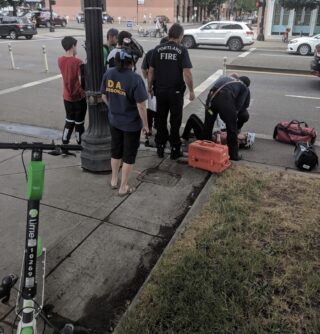
(Photo: Mark Senf)
There are now 587 more electric scooters on Portland streets than this time last year. In the first 10 weeks of the current pilot program, the City of Portland says 16 of those scooters were involved in a collision.
We can confirm that at least two of those collisions involved a bicycle rider. There was the infamous collision during the recent protests downtown that was caught on tape by KGW News (watch it below).
And back in July, reader Mark Senf sent us the image at right. He witnessed two young men on one scooter (technically illegal) collide with a bicycle rider at the intersection of Naito Parkway and SW Harvey Milk. Senf said the woman who was riding the bike suffered cuts and bruises along with a fractured shoulder. She was carted away via ambulance and her husband stayed behind to handle the details.
Beyond the injuries, what worried Senf is what happened next: He said the husband was told by the responding police officer that they wouldn’t take a report because the collision was an accident and therefore a civil matter. “I was surprised by this,” Senf said. The woman’s husband reported the collision to the scooter company (Lime) and to the Portland Bureau of Transportation.
Given their increased presence it made us wonder how scooter/bike collisions are tracked and how insurance companies will respond to them.
In response to the question about collision data, PBOT spokesman Dylan Rivera said they partner with the Multnomah County Health Department. The County tracks ER and Urgent Care visits. “If a patient mentions an e-scooter was involved in the collision, it should get recorded,” Rivera said. If 911 is called and Portland Fire & Rescue responds, they may or may not collect the data. Rivera said they encourage people to report all collisions and injuries to PBOT via e-scooter@portlandoregon.gov.
What about insurance? Will you be compensated for injuries or damages if you are hit by an e-scooter user? We asked Cynthia Newton, a lawyer and partner at Thomas, Coon, Newton & Frost, the Portland firm that recently released an e-scooter legal guide.
Advertisement
Newton said these collisions fall into grey areas where, “No clear legal rules or precedent and no standard claims practices have been established.”
“If we consider an e-scooter a motor vehicle, this leads to the question of what, if any, insurance insures the scooter?”
— Cynthia Newton, lawyer
According to Oregon Revised Statutes, e-scooter operators are subject to provisions of the Vehicle Code. Newton adds that e-scooters aren’t specifically defined as motor vehicles in Oregon law but they would “most likely” be considered as such (as per ORS 801.448). “If we consider an e-scooter a motor vehicle,” Newton says, “This leads to the question of what, if any, insurance insures the scooter? And, what insurance might be available to compensate the injured cyclist here? What insurance will indemnify the scooter operator if the injured cyclist claims that the e-scooter operator was negligent in causing her injury?”
Since the scooter was a rental, Newton says insurance companies could treat it just like you were renting a car. But they might not. “This is new territory, and we are unaware of anyone successfully invoking auto coverage for a collision of this type.”
What about the scooter operator’s homeowner’s or renter’s insurance? Here’s what Newton thinks:
“Homeowner’s insurance does cover the homeowner’s negligence. And, we have been successful recovering funds from homeowner’s insurance where a cyclist collided with and injured another cyclist. However, most homeowner’s policies contain exclusions for negligent operation of a motor vehicle, which would preclude coverage here since the e-scooter is quite arguably a motor vehicle.”
Would the bicycle rider’s auto insurance help?
“Personal injury protection (PIP) coverage for medical expenses is required coverage in all Oregon policies and pays the insured’s losses when the insured is injured while cycling (because cyclists meet the definition of “pedestrian” in most policies). Here, the cyclist could make a PIP claim against her own auto coverage for her medical expenses and lost income. However, this coverage may not be enough to cover her bills and compensate her, since standard PIP medical is only $15,000 and standard PIP wage loss benefit 70% of income. Finally, the cyclist may look to the uninsured motorist coverage of her auto policy for additional compensation. Like PIP, UM coverage covers an insured when injured in a collision with a vehicle.”
In the end, Newton says it’s likely to take some time before insurance companies accept claims for e-scooter collisions. To hasten that timeline it might take persistence and effort from injured parties to scrutinize relevant laws and insurance policy language.
In the meantime, try to keep the rubber side down.
— Jonathan Maus: (503) 706-8804, @jonathan_maus on Twitter and jonathan@bikeportland.org
Never miss a story. Sign-up for the daily BP Headlines email.
BikePortland needs your support.

